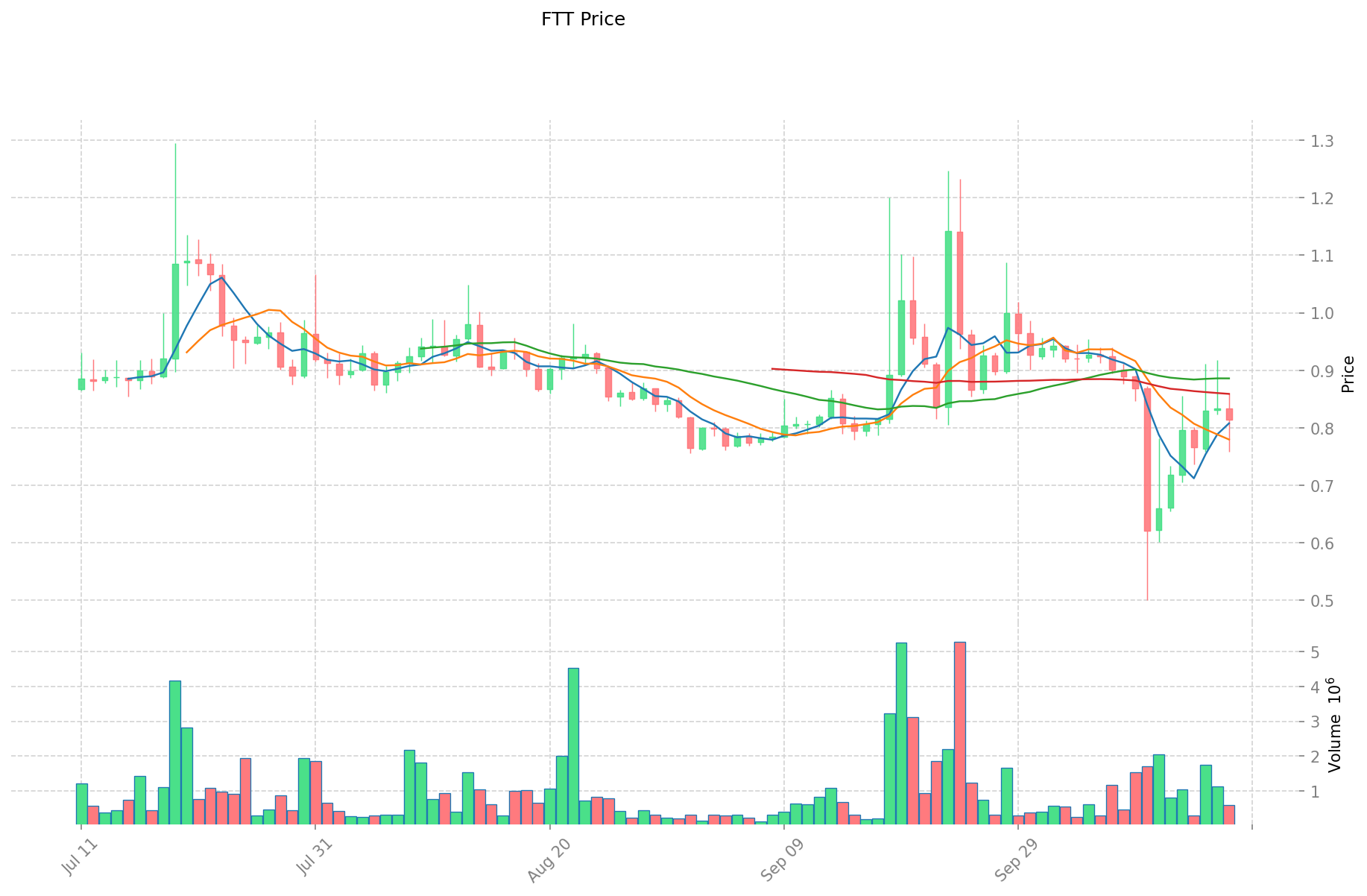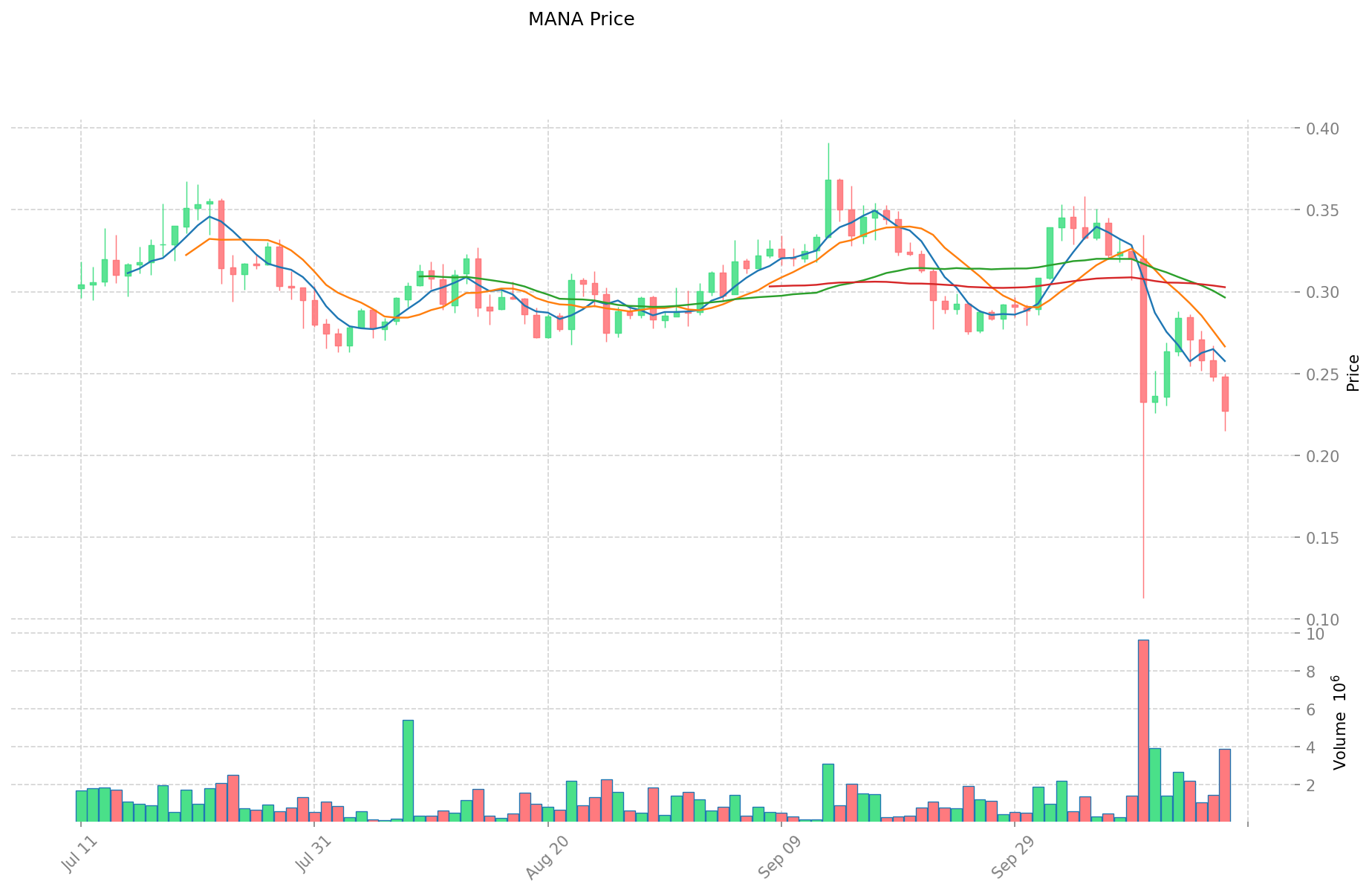FTT vs MANA: Metaverse Ekosisteminde İki Popüler Kripto Paranın Karşılaştırılması


Giriş: FTT ile MANA Arasında Yatırım Karşılaştırması
Kripto para piyasasında FTT ile MANA’nın karşılaştırılması, yatırımcıların kaçınamayacağı bir gündemdir. Bu iki varlık, piyasa değeri sıralaması, kullanım alanı ve fiyat performansı açısından belirgin farklılıklar gösterdiği gibi, kripto varlık konumlandırmasında da birbirinden ayrılır.
FTT (FTT): 2019’da piyasaya sürülmesinden bu yana, FTX borsa ekosisteminin yerel token’ı olarak piyasa tarafından tanınmıştır.
MANA (MANA): 2017’de tanıtılan MANA, blokzincir tabanlı sanal dünyalar alanında öncü kabul edilir ve metaverse kavramına yapılan en erken yatırımlardan birini temsil eder.
Bu makalede FTT ile MANA’nın yatırım değerleri; tarihsel fiyat hareketleri, arz mekanizmaları, kurumsal benimseme, teknolojik ekosistemler ve gelecek tahminleri üzerinden kapsamlı bir şekilde karşılaştırılacak, yatırımcıların en çok merak ettiği şu soruya yanıt aranacaktır:
"Şu anda hangisi daha avantajlı bir alım?"
I. Fiyat Geçmişi Karşılaştırması ve Güncel Piyasa Durumu
FTT ve MANA Tarihsel Fiyat Hareketleri
- 2021: FTT, 10 Eylül 2021’de 84,18 $ ile zirve yaptı.
- 2021: MANA, 25 Kasım 2021’de metaverse ilgisinin etkisiyle 5,85 $’a ulaştı.
- Karşılaştırma: Son piyasa döngüsünde FTT, 84,18 $’dan 0,536571 $’a kadar geriledi; MANA ise 5,85 $’dan 0,2271 $’a düştü.
Güncel Piyasa Durumu (18 Ekim 2025)
- FTT güncel fiyatı: 0,8129 $
- MANA güncel fiyatı: 0,2271 $
- 24 saatlik işlem hacmi: FTT 472.583,61 $ – MANA 890.324,37 $
- Piyasa Duyarlılık Endeksi (Korku & Açgözlülük): 22 (Aşırı Korku)
Gerçek zamanlı fiyatları görmek için tıklayın:
- FTT güncel fiyatı için Piyasa Fiyatı
- MANA güncel fiyatı için Piyasa Fiyatı


II. FTT ile MANA’nın Yatırım Değerini Belirleyen Temel Unsurlar
Arz Mekanizması Karşılaştırması (Tokenomik)
- FTT: FTX borsasının kârıyla token yakım mekanizmasına sahip sınırlı arz
- MANA: Decentraland’deki arazi alımları sayesinde deflasyonist mekanizma ve 2,19 milyar adet sabit maksimum arz
- 📌 Tarihsel Eğilim: Deflasyonist modeller, artan kullanım ve taleple birlikte uzun vadeli fiyat artışını destekleme eğilimindedir.
Kurumsal Benimseme ve Piyasa Kullanımları
- Kurumsal Pozisyonlar: MANA, metaverse alanında daha çeşitli kurumsal ilgiyi kendine çekerken; FTT, ağırlıklı olarak FTX ekosisteminde yoğunlaşmıştı
- Kurumsal Kullanım: MANA, metaverse varlığı için büyük markalarla iş birlikleri sağladı; FTT’nin faydası ise esasen kapatılan FTX borsasıyla sınırlıydı
- Ulusal Politikalar: FTX’in çöküşü sonrası borsa token’larında düzenleyici denetim arttı; metaverse token’ları ise daha düşük oranda yasal baskı görüyor
Teknik Gelişim ve Ekosistem Oluşturma
- FTT Teknik Gelişimi: FTX’in kapanmasıyla geliştirme süreci fiilen durdu
- MANA Teknik Gelişimi: Decentraland platformunda kullanıcı deneyimi ve işlevselliği artıran düzenli güncellemelerle gelişim devam ediyor
- Ekosistem Karşılaştırması: MANA, Decentraland bünyesinde aktif NFT pazarı, sanal arazi ve üretici ekonomisi destekler; FTT’nin ekosistemi ise FTX ile birlikte sona erdi
Makroekonomik ve Piyasa Döngüleri
- Enflasyon Ortamında Performans: MANA, dijital gayrimenkul ile enflasyona karşı koruma olanağı sunarken; FTT, içsel değer mekanizmalarından yoksundur
- Makroekonomik Para Politikası: Faiz değişimleri, MANA gibi spekülatif varlıkları etkiler; yine de, MANA FTT’ye göre daha güçlü piyasa konumunu korumuştur
- Jeopolitik Faktörler: Sanal dünyalara ve dijital mülkiyete artan küresel ilgi, MANA’nın uluslararası arenada uzun vadeli pozisyonunu destekliyor
III. 2025-2030 Fiyat Tahmini: FTT ve MANA
Kısa Vadeli Tahmin (2025)
- FTT: Muhafazakâr 0,496052 - 0,8132 $ | İyimser 0,8132 - 0,878256 $
- MANA: Muhafazakâr 0,117884 - 0,2267 $ | İyimser 0,2267 - 0,285642 $
Orta Vadeli Tahmin (2027)
- FTT, büyüme fazına geçebilir; tahmini fiyat aralığı 0,5846517664 – 1,0561451264 $
- MANA, boğa piyasasına girebilir; tahmini fiyat aralığı 0,17303070195 – 0,37338204105 $
- Temel itici güçler: Kurumsal sermaye girişi, ETF, ekosistem gelişimi
Uzun Vadeli Tahmin (2030)
- FTT: Temel senaryo 0,733271565600288 – 1,12811010092352 $ | İyimser senaryo 1,12811010092352 – 1,218358908997401 $
- MANA: Temel senaryo 0,288642440420959 – 0,481070734034932 $ | İyimser senaryo 0,481070734034932 – 0,553231344140172 $
Feragatname: Bu analiz tarihsel verilere ve piyasa eğilimlerine dayanmaktadır. Kripto para piyasaları yüksek volatiliteye ve öngörülemezliğe sahiptir. Bu tahminler yatırım tavsiyesi değildir. Yatırım kararlarınızda daima kendi araştırmanızı yapınız.
FTT:
| Yıl | Tahmini En Yüksek Fiyat | Tahmini Ortalama Fiyat | Tahmini En Düşük Fiyat | Fiyat Değişim Oranı |
|---|---|---|---|---|
| 2025 | 0,878256 | 0,8132 | 0,496052 | 0 |
| 2026 | 1,04024544 | 0,845728 | 0,43132128 | 4 |
| 2027 | 1,0561451264 | 0,94298672 | 0,5846517664 | 16 |
| 2028 | 1,159496470912 | 0,9995659232 | 0,829639716256 | 22 |
| 2029 | 1,17668900479104 | 1,079531197056 | 0,68010465414528 | 32 |
| 2030 | 1,218358908997401 | 1,12811010092352 | 0,733271565600288 | 38 |
MANA:
| Yıl | Tahmini En Yüksek Fiyat | Tahmini Ortalama Fiyat | Tahmini En Düşük Fiyat | Fiyat Değişim Oranı |
|---|---|---|---|---|
| 2025 | 0,285642 | 0,2267 | 0,117884 | 0 |
| 2026 | 0,35095427 | 0,256171 | 0,14857918 | 12 |
| 2027 | 0,37338204105 | 0,303562635 | 0,17303070195 | 33 |
| 2028 | 0,45016820957325 | 0,338472338025 | 0,324933444504 | 49 |
| 2029 | 0,56782119427074 | 0,394320273799125 | 0,354888246419212 | 73 |
| 2030 | 0,553231344140172 | 0,481070734034932 | 0,288642440420959 | 111 |
IV. Yatırım Stratejisi Karşılaştırması: FTT ile MANA
Uzun Vadeli ve Kısa Vadeli Yatırım Stratejileri
- FTT: Spekülatif toparlanma ve yüksek risk arayan yatırımcılar için uygun
- MANA: Metaverse potansiyeli ve dijital varlık maruziyeti isteyen yatırımcılar için ideal
Risk Yönetimi ve Varlık Dağılımı
- Temkinli yatırımcı: FTT: %0 – MANA: %5
- Aggresif yatırımcı: FTT: %1 – MANA: %10
- Koruma araçları: Stablecoin tahsisi, opsiyonlar, çapraz döviz portföyleri
V. Potansiyel Risk Karşılaştırması
Piyasa Riski
- FTT: Belirsizlik ve temel fayda eksikliği nedeniyle yüksek volatilite
- MANA: Metaverse ilgisi dalgalanmalarına ve genel kripto piyasa duyarlılığına bağımlı
Teknik Risk
- FTT: Sürekli geliştirme eksikliği, değer kaybı riski
- MANA: Ölçeklenebilirlik ve platform istikrarı sorunları
Düzenleyici Risk
- Küresel düzenlemeler, MANA’yı borsa token’larına (FTT gibi) göre daha az etkilemektedir
VI. Sonuç: Hangisi Daha Avantajlı?
📌 Yatırım Değeri Özeti:
- FTT avantajları: Borsa varlıkları geri kazanılırsa spekülatif getiri potansiyeli
- MANA avantajları: Aktif ekosistem geliştirme, metaverse maruziyeti, marka iş birlikleri
✅ Yatırım Tavsiyesi:
- Yeni yatırımcılar: Metaverse maruziyeti için düşük MANA tahsisi değerlendirilebilir, FTT’den kaçınılmalı
- Tecrübeli yatırımcılar: MANA, daha iyi risk-getiri potansiyeli sunar; FTT sadece yüksek riskli portföylere uygundur
- Kurumsal yatırımcılar: MANA, çeşitlendirilmiş metaverse maruziyeti sağlar; FTT genellikle önerilmez
⚠️ Risk Uyarısı: Kripto para piyasaları aşırı volatiliteye sahip. Bu makale yatırım tavsiyesi niteliğinde değildir. None
VII. Sıkça Sorulan Sorular
S1: FTT ile MANA arasındaki temel farklar nelerdir? C: FTT, FTX borsasının yerel token’ıydı; MANA ise Decentraland metaverse’inin para birimi. FTT’nin ekosistemi FTX ile sona erdi, MANA ise aktif sanal dünyayı ve gelişimi desteklemeye devam ediyor.
S2: Hangi token daha istikrarlı fiyat performansı gösterdi? C: MANA, FTT’ye kıyasla daha stabil fiyat hareketi sergiledi. Her ikisinde de rekor seviyelerden sert düşüşler yaşansa da, FTT FTX’in çöküşü nedeniyle daha büyük bir değer kaybı yaşadı.
S3: FTT ile MANA’nın gelecekteki potansiyeli nasıl farklılaşıyor? C: MANA, Decentraland platformunun sürekli gelişimi ve metaverse teknolojilerine artan ilgiyle daha olumlu bir gelecek sunuyor. FTT’nin ise sınırlı fayda ve aktif geliştirme olmamasıyla birlikte geleceği oldukça belirsiz.
S4: FTT ve MANA yatırımlarında başlıca riskler nelerdir? C: FTT, FTX’in çöküşü ve geliştirme eksikliği nedeniyle aşırı risk taşır. MANA ise genel kripto volatilitesi ve metaverse projelerine ilişkin düzenleyici risklerle karşılaşır.
S5: Kurumsal yatırımcılar FTT’ye karşı MANA’yı nasıl değerlendiriyor? C: Kurumsal yatırımcılar, metaverse sektörüne ve iş birliklerine maruz kalması nedeniyle MANA’yı daha olumlu görüyor. FTT, FTX’in çöküşünden sonra kurumlar tarafından büyük ölçüde tercih edilmiyor.
S6: Temkinli ve agresif yatırımcılar için önerilen portföy dağılımı nedir? C: Temkinli yatırımcılar FTT için %0, MANA için en fazla %5 tahsis edebilir. Agresif yatırımcılar FTT’ye %1 (yüksek riskli pozisyon), MANA’ya ise en fazla %10 tahsis edebilir.
S7: FTT ile MANA’nın tokenomikleri nasıl karşılaştırılır? C: MANA, Decentraland’deki arazi alımlarıyla deflasyonist mekanizmaya sahip sabit maksimum arza sahiptir. FTT ise sınırlı arz ve token yakım mekanizmasına sahipti, ancak FTX’in çökmesiyle bu mekanizma artık işlevsiz.

FORT ve MANA: Dijital Varlık Yönetiminin Geleceği için İki Lider Blockchain Çözümünün Karşılaştırılması

CTC ve SAND: İki Öncü Konuşma Tanıma Teknolojisinin Karşılaştırmalı Analizi

TRVL vs MANA: Dijital Gayrimenkul Pazarında İki Önde Gelen Metaverse Token'ının Karşılaştırılması

THETA ve MANA: Metaverse Tokenlarının Rekabeti - Hangi Sanal Gerçeklik Coin’i Piyasaya Yön Verecek?

SKL ve MANA: 2023 yılında hangi kripto para birimi daha yüksek büyüme potansiyeli sunuyor?

ACX vs MANA: Metaverse Devlerinin Mücadelesi - Hangi Sanal Dünya Lider Olacak?

Bitcoin fiyatı pound cinsinden, traderların şimdi bilmesi gerekenler.

Kripto para piyasasında Pivot Noktası ticaret stratejilerini ustalıkla kullanmak

Yeni Madenciler İçin En İyi Kripto Madencilik Platformları

Blockchain’de Kriptografik Hashleme’nin Temelleri: Kapsamlı Bir Rehber

Ethereum fiyatı düşüşte, bu uzun vadeli long aç fırsatı olabilir.





